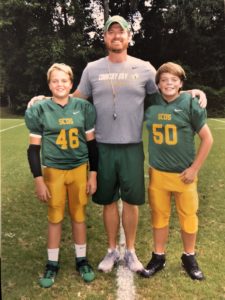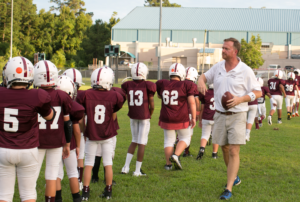Coaching & Mediation…Two Sides of the Same Coin – A Conversation with Christopher “Smitty” Smith
Fri, Oct 30th, 2020 | by Miles Mediation and Arbitration | Article | Social Share
 As a former college football player with 21 years of litigation under his belt, Miles Mediation Neutral Christopher “Smitty” Smith knows a thing or two about fighting.
As a former college football player with 21 years of litigation under his belt, Miles Mediation Neutral Christopher “Smitty” Smith knows a thing or two about fighting.
“There are a lot of similarities between football and litigation,” says Smitty, “people see them both as zero-sum games.”
But it is his past five years spent as a middle school football coach that provides his foundation as a mediator. He describes his time guiding players as a mirror to his time in a mediation. His approach as a coach is calm and grounded while stressing cooperation between the parties.
While he doesn’t get worked up about who wins and losses, Smitty is always looking to see how the process and experience can benefit both sides. “It’s funny, because in Savannah, I have probably coached a lot of the kids on both sides at one time or another, and I hate to see one team walk away with a shutout. It’s much better for a team of young kids to score some points and have something positive to build on next week.”
 As a coach, Smitty wants his players to be the best that they can be. As a mediator, he wants the parties to get the best outcome that they can get—for both sides. Sometimes, a successful mediation can feel more like a tie game, where neither side leaves a loser.
As a coach, Smitty wants his players to be the best that they can be. As a mediator, he wants the parties to get the best outcome that they can get—for both sides. Sometimes, a successful mediation can feel more like a tie game, where neither side leaves a loser.
“Given the quality of attorneys that I work with, rarely is one side going to walk away with a ‘win’ at mediation,” says Smitty. But despite this knowledge, both sides seem to open their playbook with a long bomb.
Smitty often sees that parties to a mediation can get in their own way. They may have a perfectly good case and a justifiable set of expectations. But if they are too emotional and unable to control their feelings, they can end up sparking a situation in which they’re actively destroying their own best outcome.
Smitty describes this example to illustrate how fast things can devolve in a mediation:
Let’s say there’s a case involving an injured Plaintiff. Liability is clear, and the medical specials and lost wages are undisputed. This case is, understandably, very personal to the Plaintiff.
On the other side is the Defendant. But often, it is not really the Defendant, but rather an insurance company. The Insurance Adjuster has 50 similar cases that she is charged with resolving for reasonable amounts. This case is, understandably, not personal to the adjuster.
Plaintiff kicks off with a demand of $50 million dollars. Incredulous, the Insurance Adjuster fires back an offer of $10,000.00. Out of the gate, both sides are furious, and do not trust one another.
But it doesn’t have to be this way–you just need to change the playbook.
Smitty believes that avoiding this all-too-common situation is precisely why minimizing antagonism at the start is so crucial to a successful mediation. “When emotions are under control, it is easier to come to an agreement. It is a less contentious starting point, and this increases the chance of a reasonable opening offer on each side.”
 As it turns out, the first play is an essential part of both sides’ mediation process. This is where Smitty’s coaching background comes into play. He takes control of the process right away so that everyone feels comfortable, and he can get a sense of where everyone is. Here’s how it works:
As it turns out, the first play is an essential part of both sides’ mediation process. This is where Smitty’s coaching background comes into play. He takes control of the process right away so that everyone feels comfortable, and he can get a sense of where everyone is. Here’s how it works:
Smitty begins by explaining the process and addressing the Plaintiff directly. They are usually the ones who are not familiar with the mediation process. Smitty poses open-ended questions, looking to learn about their perspective, and getting them to share their feelings. What does the injured party really want or need? In-home care for a disabled spouse? Money to cover bills while they go back to school? These discussions also help get the emotions “on the table” before starting work on the task at hand. According to Smitty, “you can’t settle a case until you settle everyone down.”
Smitty starts with the facts, reciting the undisputed facts of the case, to establish common ground, before moving on to the procedural posture. Smitty believes that this helps discover impediments to settlement, such as undisclosed medical bills or fact witnesses who have not been deposed. He asks:
- Are there any depositions outstanding?
- Is there anything in discovery that’s still outstanding?
- Are all the medical records present?
- Are there any future medical expenses?
- Have the experts been deposed?
- Are there motions pending?
After Smitty concludes his opening, everyone gets a chance to provide their side of the story. He finds that this reduces posturing in attorney opening statements. It works to limit antagonism right at the beginning. Next, he splits everyone up, and will caucus with the Plaintiff to work on a demand, or the Defendant if a pre-mediation demand has been made.
Throughout the process, Smitty works to manage expectations. If both sides are a hundred yards apart, he knows it’s probably not going to settle that day. But Smitty has found that many of his cases settle shortly after the mediation, if the channels of communication have been kept open and a certain level of trust has been achieved.
Managing expectations is a crucial part of mediation process. Smitty acts as an evaluative mediator when needed, drawing on real life experience and his knowledge of local jury verdicts. The point is to keep the momentum going — even if it is just little bit of progress. He tries to make sure that no one draws a line in the sand. Even though the process sometimes can take months, Christopher always follows up with everyone to see what they can collectively do to resolve the case.
 A good coach gets the best from his players. A good mediator gets the best from his parties. “I expect both sides to act professionally,” says Smitty. “Let’s leave the squabbling on my middle school practice field. After all, when it comes to our mediation, we’re all on the same team.”
A good coach gets the best from his players. A good mediator gets the best from his parties. “I expect both sides to act professionally,” says Smitty. “Let’s leave the squabbling on my middle school practice field. After all, when it comes to our mediation, we’re all on the same team.”
So: Why Miles Mediation & Arbitration Services?
Having practiced in Atlanta before moving to Savannah, Smitty’s years of experience mediating with different firms gave him an idea of what “doing everything right” looked like. And, in Smitty’s opinion, “Miles Mediation and Arbitration does things right.”
“I knew from my first conversation with John Miles that he had the right business philosophy and the right corporate culture for a successful mediation firm. I knew I wanted to work with the best, and the growth of the Savannah office has given me that opportunity.” Smitty says that he benefits from working in a collaborative, team environment where the mediators genuinely support each other in developing their practices. He believes the connected environment naturally leads to more business and more options for clients.
As a football coach, Smitty stresses teamwork to win football games. In mediation, he stresses teamwork so that both sides win the settlement.

Christopher “Smitty” Smith is a mediator with Miles Mediation & Arbitration, and has over twenty years of experience litigating construction, business, and logistics disputes.
Learn more about Christopher “Smitty” Smith or view his calendar here.

